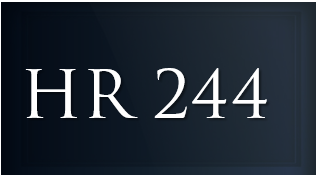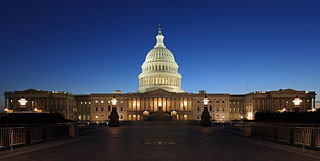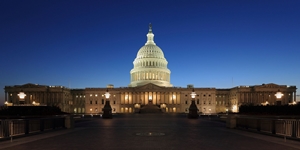May 8, 2017 •
US Spending Bill Has Campaign Finance Provisions
Among the amendments in the 2017 Consolidated Appropriations Act that passed into law on May 5 are two provisions affecting campaign financing. House Resolution 244 explicitly prohibits the Internal Revenue Service from making new rules concerning the political speech or […]
 Among the amendments in the 2017 Consolidated Appropriations Act that passed into law on May 5 are two provisions affecting campaign financing.
Among the amendments in the 2017 Consolidated Appropriations Act that passed into law on May 5 are two provisions affecting campaign financing.
House Resolution 244 explicitly prohibits the Internal Revenue Service from making new rules concerning the political speech or activity of 501(c)(4) organizations. The legislation also prohibits the Securities and Exchange Commission from finalizing, issuing, or implementing any rule, regulation, or order regarding the disclosure of political contributions, contributions to tax exempt organizations, or dues paid to trade associations.
The 708 page omnibus spending bill, passed by Congress on May 4 and signed by the president on May 5, funds the U.S. government through September 30.
December 23, 2015 •
2016 Omnibus Appropriations Bill’s Campaign Finance Changes
Among the riders in the federal 2016 Omnibus Appropriations bill passed into law on December 18, 2015, were two provisions affecting campaign finance. Congress explicitly prohibited the Internal Revenue Service from making new rules concerning the political speech or activity […]
 Among the riders in the federal 2016 Omnibus Appropriations bill passed into law on December 18, 2015, were two provisions affecting campaign finance. Congress explicitly prohibited the Internal Revenue Service from making new rules concerning the political speech or activity of 501(c)(4) organizations. The legislation also prohibits the Securities and Exchange Commission from issuing regulations requiring corporations to disclose their political activity to their shareholders.
Among the riders in the federal 2016 Omnibus Appropriations bill passed into law on December 18, 2015, were two provisions affecting campaign finance. Congress explicitly prohibited the Internal Revenue Service from making new rules concerning the political speech or activity of 501(c)(4) organizations. The legislation also prohibits the Securities and Exchange Commission from issuing regulations requiring corporations to disclose their political activity to their shareholders.
The Senate’s version of the Financial Services and General Government Appropriations Act, 2016, Senate Bill 1910, contained language altering the law regarding coordination between candidates and political parties. However, opposition from both parties prevented this rider making it in the final passed bill. The final bill also did not include a rider from House Resolution 2995, the House’s version of the bill, which would have barred the use of funds to recommend or require any entity submitting an offer for a federal contract to disclose specified political contributions as a condition of submitting the offer.
Photo of the United States Capitol by Martin Falbisoner on Wikimedia Commons.
December 15, 2014 •
Federal Omnibus Bill Allows Increased Political Contributions to Political Parties
With the Senate passing the House’s omnibus bill, the limits for political contributions to federal political parties will increase when President Barack Obama signs the bill. Included as a rider with House Resolution 83 is an amendment to the Federal […]
 With the Senate passing the House’s omnibus bill, the limits for political contributions to federal political parties will increase when President Barack Obama signs the bill. Included as a rider with House Resolution 83 is an amendment to the Federal Election Campaign Act of 1971 allowing additional contributions to political parties for presidential nominating conventions, for preparation for and the conduct of election recounts and contests and other legal proceedings, and for the construction, purchase, renovation, operation, and furnishing of one or more buildings for party headquarters.
With the Senate passing the House’s omnibus bill, the limits for political contributions to federal political parties will increase when President Barack Obama signs the bill. Included as a rider with House Resolution 83 is an amendment to the Federal Election Campaign Act of 1971 allowing additional contributions to political parties for presidential nominating conventions, for preparation for and the conduct of election recounts and contests and other legal proceedings, and for the construction, purchase, renovation, operation, and furnishing of one or more buildings for party headquarters.
An additional provision of the bill prohibits the federal government from recommending or requiring any entity submitting an offer for a federal contract to disclose, as a condition of submitting an offer, any political contribution, expenditure, independent expenditure, or disbursement for an electioneering communication by the offeror, its officers or directors, or any of its affiliates or subsidiaries.
Another provision included in the bill prohibits the federal government from paying for a portrait of an officer or employee of the federal government, including the president, the vice president, a member of Congress (including a delegate or a resident commissioner to Congress), the head of an executive branch agency, or the head of an office of the legislative branch.
The president has said he will sign the bill.
UDPATE: On December 16, President Obama signed the House Resolution 83 into law.
Photo of the U.S. Capitol by Martin Falbisoner on Wikimedia Commons.
State and Federal Communications, Inc. provides research and consulting services for government relations professionals on lobbying laws, procurement lobbying laws, political contribution laws in the United States and Canada. Learn more by visiting stateandfed.com.


